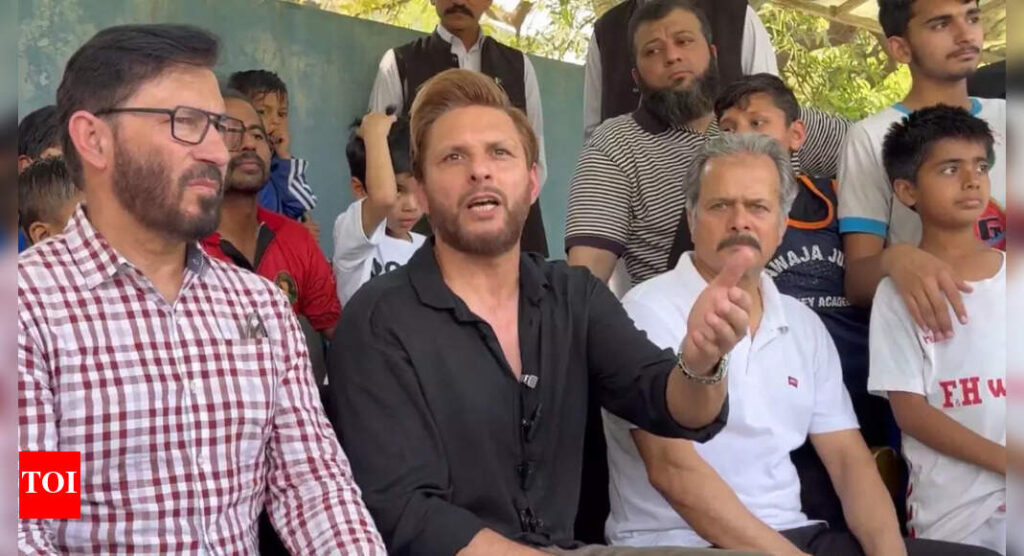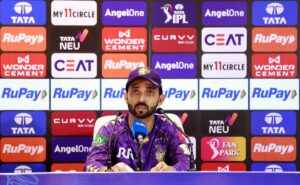
THIS devotee of Lord Shiva fed him meat and sacrificed his eyes in devotion
Shahid Afridi Controversial Statements About India-Pakistan Relations and Terrorism
Table of Contents
Former Pakistan captain Shahid Afridi speaks during an event where he made controversial statements about India. (Screengrab)
Former Pakistan cricket captain Shahid Afridi has ignited diplomatic tensions with his recent controversial statements regarding the terrorist attack in Pahalgam, Kashmir. The cricketer’s remarks, which accuse India of orchestrating attacks against its own citizens, have further strained the already tense relationship between the neighboring countries. Afridi’s statements have drawn significant attention from media outlets across both nations, with many questioning the appropriateness of a sports figure making such politically charged allegations.
Recent Controversial Statements on Pahalgam Attack
Shahid Afridi’s controversial statements came in response to the recent terrorist attack in Pahalgam, Kashmir, where at least 26 people, primarily tourists, were killed at the Baisaran meadows. In his remarks to Pakistani media, Afridi questioned the response of Indian security forces, stating: “The terrorists continued to kill people in Pahalgam for an hour, and not a single Indian soldier out of 8 lakhs showed up. But when they did, they blamed Pakistan.”
This assertion forms part of a pattern of Shahid Afridi controversial statements that have characterized his post-cricket career. The former all-rounder has increasingly positioned himself as a political commentator on India-Pakistan relations, often making provocative claims that resonate with certain domestic audiences but create diplomatic friction.
Key Points About Afridi’s Statements
- Claims Indian security forces failed to respond promptly to the Pahalgam attack
- Suggests India falsely attributes terrorist activities to Pakistan
- Makes allegations without providing substantiating evidence
- Continues a pattern of controversial political commentary
Accusations Against Indian Government
Among the most inflammatory of Shahid Afridi’s controversial statements was his direct accusation that the Indian government deliberately orchestrates attacks against its own citizens. “India carries out terrorism itself, kills its own people, and then puts the blame on Pakistan,” Afridi claimed in his media appearance, reinforcing conspiracy theories that have been repeatedly rejected by international observers and security experts.
Such statements from the former Pakistan cricket captain represent a serious diplomatic affront, particularly given the sensitive nature of terrorism allegations between the two nuclear-armed neighbors. Security analysts note that Afridi’s controversial statements could potentially inflame tensions in a region already characterized by historical mistrust and periodic conflict.
Afridi’s Claims About Islam and Peace
In the same interview where he made controversial statements about India, Afridi attempted to position Pakistan as a peace-seeking nation. “No country or religion supports terrorism. We always support peace. Islam teaches us peace only, and Pakistan never supports such kinds of acts,” he stated, creating a stark contrast between his characterization of Pakistan’s intentions and his allegations against India.
Critics have pointed out the apparent contradiction in Shahid Afridi’s controversial statements, noting that while claiming to advocate for peace, his inflammatory rhetoric potentially undermines diplomatic efforts between the two nations. Political commentators suggest that Afridi’s statements reflect broader narratives that circulate within certain segments of Pakistani media and political discourse.
Afridi on Sports Diplomacy Between Nations
Interspersed with his controversial statements about terrorism, Afridi also addressed the role of sports in India-Pakistan relations. “We have always tried to improve our relations with India,” he claimed, before noting the challenges faced by Pakistani athletes. “We received so many threats before travelling to India. During the 2016 T20 World Cup, I was the captain, and I had no clue whether we would go or not.”
Afridi went on to criticize what he perceives as inconsistency in India’s approach to sports diplomacy: “Sports diplomacy is also good. They send their kabaddi team here, but they can’t send their cricket team. If you want to shut it down, then do it completely, or let sport.”
Historical Context of Cricket Diplomacy
Cricket has historically served as both a bridge and a battlefield for India-Pakistan relations. Matches between the two nations routinely draw massive viewership and have occasionally been used as platforms for diplomatic engagement. However, political tensions have frequently disrupted sporting schedules, with bilateral cricket series between the countries suspended for extended periods.
Criticism of Indian Media Coverage
Another target of Shahid Afridi’s controversial statements was the Indian media’s coverage of the Pahalgam attack. “It’s surprising that within an hour of the attack, their media turned into Bollywood. For God’s sake, don’t make everything Bollywood,” Afridi remarked on Samaa TV, suggesting that Indian media sensationalized the incident.
He further expressed a dismissive attitude toward Indian media coverage: “I was astonished, in fact, I was enjoying the way they were talking.” This comment has drawn particular criticism as appearing to trivialize a tragedy that resulted in multiple civilian deaths, further characterizing the problematic nature of Afridi’s public statements.
Wider Diplomatic Context
Shahid Afridi’s controversial statements about India come against a backdrop of longstanding tensions between Pakistan and India. The two countries have fought multiple wars since independence in 1947, with Kashmir remaining a major flashpoint. Terrorist attacks have frequently exacerbated tensions, with India regularly accusing Pakistan of harboring and supporting militant groups—charges that Pakistan consistently denies.
International relations experts suggest that public figures like Afridi making provocative statements can complicate diplomatic efforts and reinforce negative stereotypes on both sides of the border. While freedom of expression is an important value, the responsibility of public figures to exercise caution when addressing sensitive geopolitical issues remains a subject of ongoing debate.
The Impact of Public Figures on Diplomacy
Celebrity statements on international relations can sometimes carry disproportionate weight in shaping public opinion. Shahid Afridi’s controversial statements, given his prominence as a former cricket captain, reach millions of people across South Asia, potentially influencing perceptions in ways that formal diplomatic channels cannot easily counteract.






